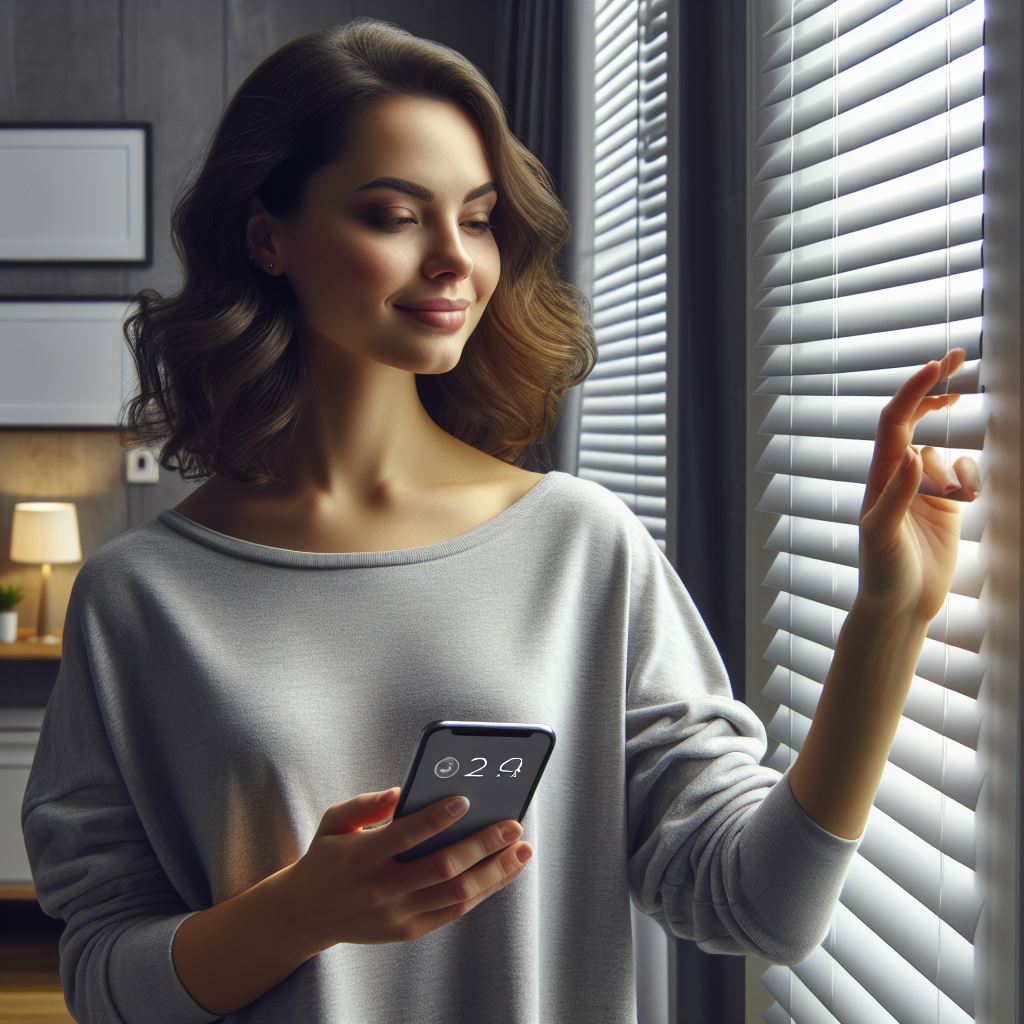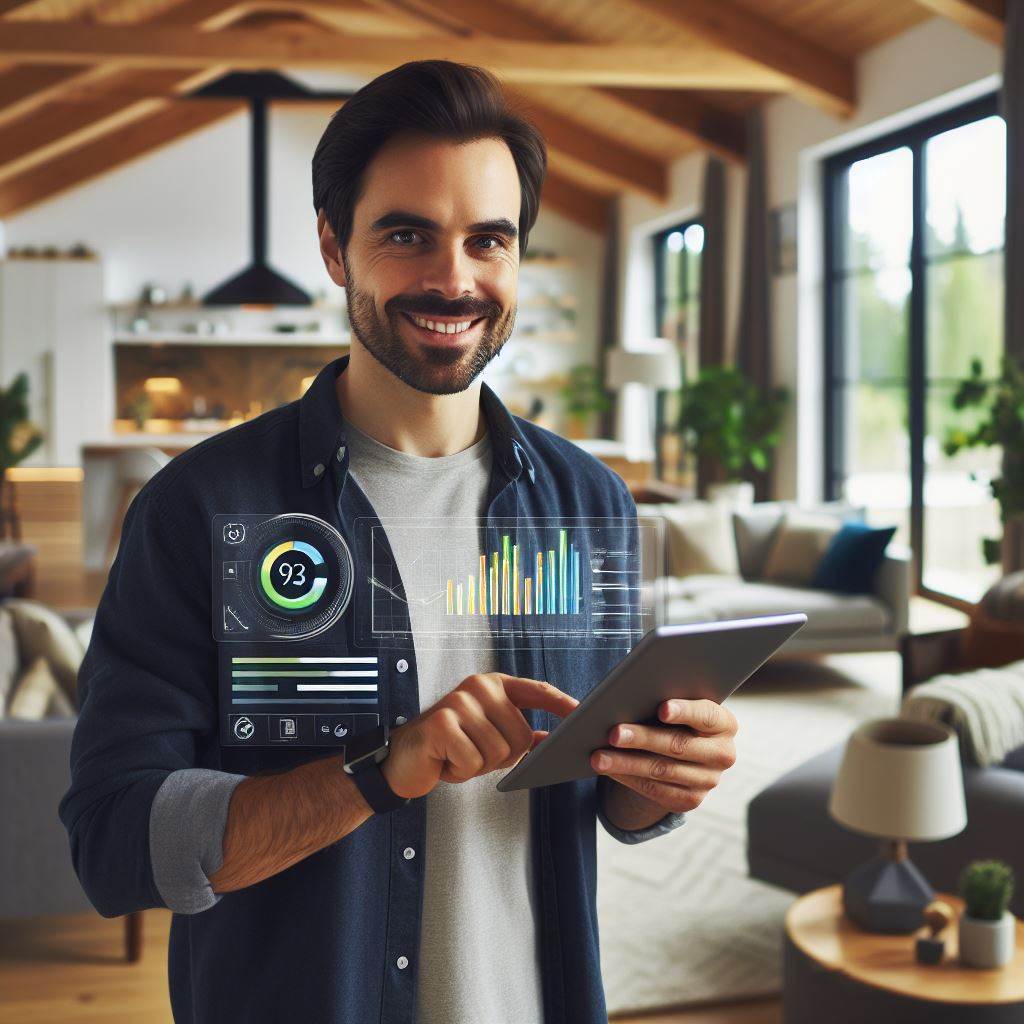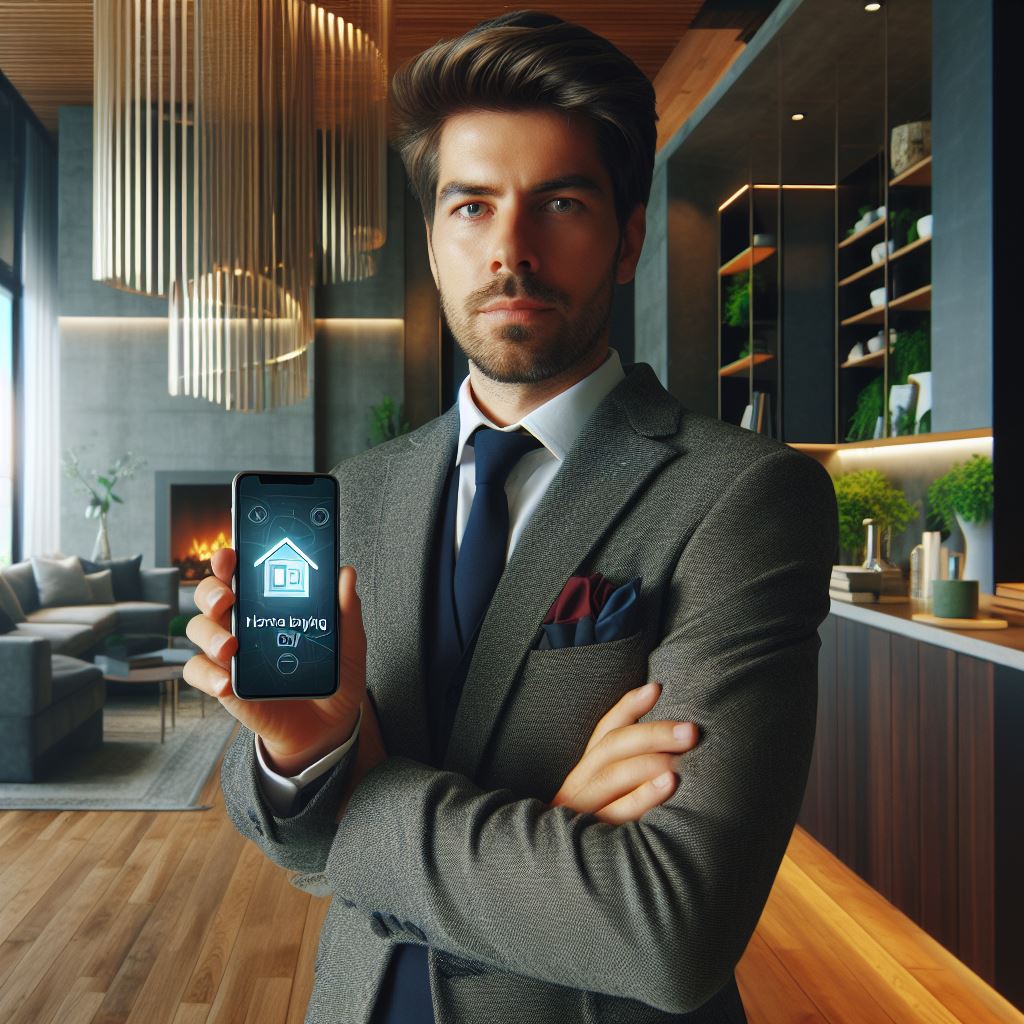Introduction
Smart blinds are a type of window covering that can be controlled remotely using technology.
Comfort and efficiency are key considerations for homeowners as they strive for a better living environment.
This blog post aims to explore the various benefits of incorporating smart blinds into homes.
Smart blinds offer convenience by allowing users to control the amount of light entering a room.
They can be adjusted remotely, providing flexibility and ensuring privacy without the need for manual operation.
In addition to comfort, smart blinds also contribute to energy efficiency by reducing the reliance on artificial lighting.
By automatically adjusting to natural lighting conditions, they help save energy and lower utility bills.
Smart blinds can also be programmed to respond to weather conditions, optimizing energy usage throughout the day.
Their integration with smart home systems enables further automation and customization options.
With voice command capabilities, smart blinds can be controlled hands-free, making daily routines easier and more efficient.
Furthermore, these blinds come in various designs and materials, complementing any interior style.
In essence, smart blinds are an excellent addition to any home, offering both comfort and energy efficiency benefits.
By embracing this technology, homeowners can enhance their living spaces while reducing their impact on the environment.
What are Smart Blinds?
Definition and explanation of smart blinds
Smart blinds are innovative window coverings that can be controlled remotely through a smartphone or home automation system.
These blinds are equipped with motorized mechanisms that allow for convenient adjustment of light and privacy levels.
Unlike traditional blinds, which require manual operation, smart blinds offer the convenience of remote control, allowing users to effortlessly regulate the amount of light and heat entering a room.
Features and capabilities of smart blinds
- Remote control: Smart blinds can be controlled through a smartphone app or integrated with voice assistants like Amazon Alexa or Google Assistant. This feature provides easy access and flexibility for users to adjust the blinds from any location.
- Automation: Smart blinds can be programmed to open or close at specific times of the day, creating a hands-free experience for homeowners. This feature allows for energy efficiency by maximizing natural light during the day and providing privacy at night.
- Light sensors: Some smart blinds come with built-in light sensors that automatically adjust the blinds according to the amount of sunlight entering a room. This ensures optimal lighting conditions and prevents unnecessary glare or fading of furniture.
- Energy efficiency: By automatically adjusting the blinds based on the external conditions, smart blinds can help regulate the temperature inside a room. This reduces reliance on heating or cooling systems, leading to energy savings and lower utility bills.
Types of smart blinds available in the market
- Motorized blinds: These blinds are powered by a motor mechanism that allows for smooth and quiet operation. Motorized blinds can be controlled remotely and can be retrofit into existing window coverings.
- Solar-powered blinds: These blinds are equipped with solar panels that harness energy from the sun to power the motor. Solar-powered blinds are environmentally friendly and eliminate the need for traditional wiring or batteries.
- Smart fabric blinds: These blinds use advanced fabric technology that can manipulate light and heat. Smart fabric blinds can filter out harmful UV rays, control brightness levels, and even provide insulation to improve energy efficiency.
- Remote-controlled blinds: These blinds come with a handheld remote control or a wall-mounted switch for convenient operation. Remote-controlled blinds are the most common type of smart blinds and are available in various designs and materials.
In fact, smart blinds offer an enhanced level of comfort, efficiency, and convenience for homeowners.
With their remote control capabilities, automation features, and various types available in the market, smart blinds have transformed the way we control light and privacy in our homes.
By integrating smart blinds into our living spaces, we can create a more comfortable and energy-efficient environment.
Read: Real-Time Data: Changing Real Estate Dynamics
Benefits of Smart Blinds
Smart blinds offer numerous benefits that enhance both comfort and efficiency in your home.
By allowing you to control the amount of light and privacy in your space, they provide an unparalleled level of convenience.
Enhanced Comfort
One of the key advantages of smart blinds is their ability to adapt to different times of the day.
With customizable settings, you can easily adjust the blinds to suit your needs, whether it’s to maximize natural light during the day or create a cozy atmosphere in the evening.
What sets smart blinds apart is their remote access feature.
This means you can conveniently control the blinds from anywhere, using your smartphone or other devices.
Imagine being able to adjust the blinds without even leaving your couch or bed.
Energy Efficiency
In addition to enhanced comfort, smart blinds offer significant energy efficiency benefits.
By optimizing the use of natural light, you can reduce your energy consumption and reliance on artificial lighting.
This not only benefits the environment but also saves you money on your utility bills.
Integrating smart blinds with your home’s automation system takes their energy efficiency to the next level.
By connecting them to smart home systems, you can automate the opening and closing of blinds based on factors such as time of day or room occupancy.
This ensures that your blinds are always operating at their optimal settings, minimizing energy waste.
The potential cost savings from energy efficiency make smart blinds an attractive investment.
With proper usage, they can significantly reduce your energy bills over time, offsetting their initial cost.
Security and Privacy
Smart blinds also contribute to enhancing security and privacy in your home.
Their presence alone can serve as a deterrent to potential burglars, as they create an impression of an occupied space even when you’re away.
Furthermore, by preventing visibility from outside, these blinds protect your privacy, allowing you to enjoy your personal space without worrying about prying eyes.
In short, smart blinds offer a range of benefits that combine comfort, energy efficiency, security, and privacy.
With the ability to control light and privacy levels, customizable settings, remote access, and integration with smart home systems, they provide unprecedented convenience.
Additionally, their optimization of natural light and potential savings on utility bills make them an eco-friendly and cost-effective choice.
Lastly, smart blinds contribute to your home’s security by acting as a deterrent to burglars and ensuring your privacy.
Invest in smart blinds today and elevate your home living experience.
Read: Smart Home Gadgets: Upscaling Your Property
Installation and Integration
DIY installation options
- Installing smart blinds on your own can be a cost-effective and satisfying option.
- Follow the manufacturer’s instructions carefully to ensure a smooth installation process.
- DIY installation allows you to customize and adjust the blinds according to your preferences.
- Make sure to measure your windows accurately before purchasing the smart blinds.
- DIY installation may require basic tools such as a drill, screwdriver, and measuring tape.
Professional installation considerations
- Hiring a professional to install smart blinds guarantees a flawless and hassle-free experience.
- Professionals have the expertise and knowledge to tackle any installation challenges that may arise.
- They can provide advice on the best placement and configuration of the blinds for maximum efficiency.
- If you’re not confident in your DIY skills or prefer a hands-off approach, professional installation is recommended.
- Research and compare different installation service providers to find the best fit for your needs.
Compatibility with different home automation systems
- Before purchasing smart blinds, ensure they are compatible with your existing home automation system.
- Check if they can be controlled through popular systems like Amazon Alexa, Google Assistant, or Apple HomeKit.
- Some smart blinds may require additional hubs or adapters to integrate with specific home automation systems.
- Consider the compatibility of your smart blinds with other smart devices in your home for seamless automation.
- Ensure that the control app or platform of your chosen home automation system supports the features of the blinds.
Integration challenges and solutions
- Incompatibility between smart blinds and home automation systems can be a challenge.
- Consult the smart blind manufacturer or home automation service provider for troubleshooting assistance.
- Sometimes firmware updates can resolve integration issues, so keep your devices up to date.
- If integration challenges persist, consider contacting professional installers or tech support for further help.
- Research and invest in compatible devices to minimize integration problems and ensure a smooth experience.
Installing and integrating smart blinds into your home can enhance both comfort and efficiency.
Whether you choose to do it yourself or hire a professional, the installation process should be approached with careful consideration.
DIY installation options offer flexibility and customization, but professional installation provides assurance and expertise.
Compatibility with different home automation systems is crucial to control your smart blinds seamlessly.
However, integration challenges may arise, but with the right troubleshooting and support, these can be overcome.
By taking into account the installation and integration aspects, you can enjoy the benefits of smart blinds to their fullest potential.
Read: Data in Real Estate: Identifying Market Gaps

Popular Smart Blind Brands
Top brands in the market
- Somfy: Known for their motorized blinds, Somfy offers a wide range of smart blind solutions.
- Lutron: Lutron is a well-established brand that offers smart blinds with advanced integration capabilities.
- Bali: Bali offers a variety of smart blinds that are customizable and stylish to match any home decor.
- Hunter Douglas: Hunter Douglas is a reputable brand known for their high-quality smart blinds with energy-saving features.
- Graber: Graber offers a range of smart blinds that are designed to provide both comfort and convenience.
Comparison of features, prices, and user reviews
- Somfy: Their smart blinds can be controlled remotely and have options for timers and sensors. Prices range from $250 to $600. Users rave about the ease of installation and smooth operation.
- Lutron: Lutron’s smart blinds seamlessly integrate with other smart home devices. Prices range from $300 to $800. Users appreciate the extensive compatibility and customizable settings.
- Bali: Bali’s smart blinds can be controlled through smartphone apps and voice assistants. Prices range from $150 to $400. Users commend the affordable pricing and durable construction.
- Hunter Douglas: Hunter Douglas offers smart blinds with automated scheduling and energy-saving modes. Prices range from $400 to $1000. Users love the energy efficiency and luxurious designs.
- Graber: Graber’s smart blinds come with built-in light sensors and remote control options. Prices range from $200 to $500. Users highlight the simplicity of use and excellent light control.
Recommendations based on specific needs and budget
For those looking for a reliable and reputable brand, Hunter Douglas and Lutron are excellent choices.
If affordability is a priority, Bali and Graber offer budget-friendly options without compromising on quality.
Somfy is ideal for users wanting advanced features and customization possibilities.
Users seeking energy-saving solutions should consider Hunter Douglas and Lutron for their innovative technologies.
Overall, it is recommended to read user reviews and prioritize individual needs when selecting a smart blind brand.
In general, the market offers a variety of popular smart blind brands suitable for different preferences and budgets.
Understanding the features, prices, and user reviews of each brand is essential for making an informed decision.
Whether it’s Somfy, Lutron, Bali, Hunter Douglas, or Graber, there is a brand that can meet specific needs and enhance both comfort and efficiency in your home.
Read: Predictive Analytics: Future of Real Estate
Maintenance and Troubleshooting
Regular cleaning and care tips
Regularly cleaning and caring for smart blinds is essential to maintain their efficiency and prolong their lifespan. Here are some tips:
- Dusting: Use a soft cloth or feather duster to remove dust from the blinds. Do this at least once a week.
- Vacuuming: Utilize the brush attachment of your vacuum cleaner to gently remove dirt and debris. Be cautious not to damage the blinds.
- Spot cleaning: Treat stains or marks by gently dabbing the affected area with a mild detergent and a damp cloth. Avoid scrubbing vigorously, as it can damage the fabric or technology.
- Avoid water damage: Ensure that the blinds are completely dry before operating them. Excessive moisture can harm the electrical components.
- Prevent sunlight exposure: Keep the blinds closed when not in use to protect them from prolonged exposure to direct sunlight, which can cause discoloration.
Common issues and troubleshooting techniques
Despite their smart features, smart blinds might encounter occasional issues. Here are some common problems and troubleshooting techniques:
- Battery or power problems: If the blinds are not responding, check the battery or power source and replace or recharge as necessary.
- Connectivity issues: If the blinds won’t connect to your smart home system, ensure that the Wi-Fi connection is stable and strong.
- Sensor malfunctions: If the blinds fail to adjust automatically based on light, temperature, or time, check the sensors for dirt or obstructions. Clean or recalibrate them.
- Mechanical failures: If the blinds are not opening or closing smoothly, examine the tracks and mechanisms for any visible damage. Lubricate or fix accordingly.
- App or remote control glitches: If the control interface is not working properly, try resetting the app or re-pairing the remote control.
Contacting customer support for technical assistance
If troubleshooting techniques fail to resolve the issues with your smart blinds, don’t hesitate to contact customer support for technical assistance.
They are well-equipped to help you out.
- Consult the user manual: Before contacting customer support, thoroughly review the user manual for troubleshooting guidance specific to your smart blinds model.
- Gather necessary information: Prepare the necessary details such as the model number, purchase date, and any error messages displayed on the interface.
- Reach out to customer support: Contact the manufacturer’s customer support via email, phone, or live chat. Explain the problem and provide the requested information.
- Follow their instructions: Customer support will guide you through potential solutions or offer to repair or replace the blinds if needed.
- Warranty coverage: If your smart blinds are still within the warranty period, inquire about the warranty coverage for repairs or replacements.
Regular maintenance and prompt troubleshooting will ensure that your smart blinds continue to provide comfort and efficiency in your daily life.
Uncover the Details: Real Estate Crowdfunding: A Tech View
Conclusion
Recap of the benefits of smart blinds
Let’s revisit the unparalleled advantages smart blinds bring to your living space.
Convenience reigns as these blinds seamlessly integrate with your smart home system, offering control at your fingertips.
Embrace the luxury of adjusting light and privacy with a simple voice command or a tap on your smartphone.
Energy efficiency takes center stage as smart blinds adapt to changing weather conditions, optimizing natural light utilization.
This not only slashes your energy bills but also reduces your carbon footprint. Your commitment to sustainability begins with the touch of a button.
Enhanced security is another jewel in the crown of smart blinds.
Through automated schedules, create an illusion of an occupied home, deterring potential intruders.
Guard your peace of mind effortlessly, knowing your smart blinds are working in tandem with your security concerns.
Encouragement to explore smart blind options for comfort and efficiency
If you haven’t embraced the smart blind revolution, now is the perfect time.
Delve into the myriad options available and transform your living space into a haven of comfort and efficiency.
Say goodbye to the hassles of manual blinds, and welcome the future with open arms.
Upgrade your home with these intelligent window coverings, and you’ll wonder how you ever lived without them.
The fusion of cutting-edge technology and timeless comfort awaits you. Embrace the possibilities, and let your home tell a story of sophistication and efficiency.
Final thoughts and invitation for reader engagement
The world of smart blinds beckons, promising a harmonious blend of convenience and sustainability.
Have you joined the smart home revolution yet? Share your experiences, questions, or insights in the comments below.
Let’s build a community that thrives on the synergy of innovation and comfort. Together, let’s shape a future where every home is a sanctuary of smart living.




